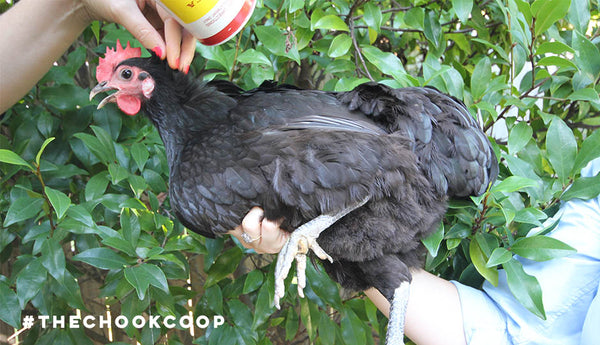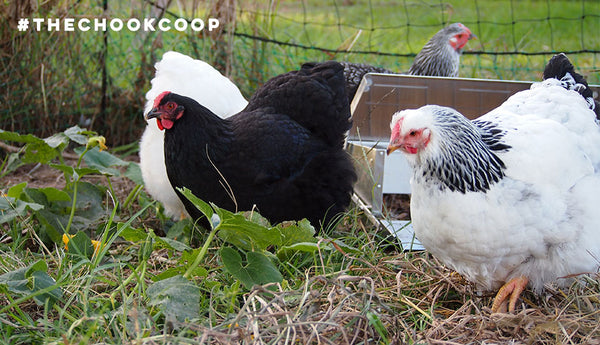Even with the most attentive chicken keeping, one of your chooks will get sick sooner or later. It is important to be able to recognise the symptoms of illness and act quickly - chickens are great at hiding their symptoms, so by the time you notice, they are usually very sick indeed.

If you think your chicken is sick...
Always, always, always take them to the vet. Always. A vet has the best possible means of helping your girls and will be able to diagnose any problems with far greater accuracy than any online resource.
This article is a helpful guide, but only a guide - your vet is the solution!
General symptoms of illness
Diagnosing chooks is an enormous challenge: they hide their symptoms, and couldn’t tell you what is wrong even if they wanted to. Furthermore, many of the external symptoms are not specific to any one illness. A sick chicken may present any of the following:
- Not eating or drinking
- Weight loss
- Weakness or lethargy
- Hiding
- Difficulty walking
- Pale comb or wattles
- Dull eyes
- Diarrhoea or abnormal droppings
- Not laying
- Losing feathers
- Fluffed up feathers
- Other abnormal behaviour
If any combination of the above describes your chicken, she may be sick, and you should take her to the vet for an exact diagnosis and treatment.
Symptoms of respiratory illness
Respiratory illnesses manifest unique symptoms compared to most other illnesses. Your chook may have a respiratory illness if she has:
- Coughing
- Wheezing or raspy breath
- Sneezing
- Runny nose
- Weepy eyes
- Swollen eyes
Again, it is virtually impossible for a backyard keeper to identify the particular illness in question. You must take your chicken to the vet for diagnosis, and treatment. This will usually involve antibiotics which your vet can prescribe.
General treatment options
If, for whatever reason, you cannot get your chook to the vet immediately, then there are some simple things that you can do to increase her odds of recovery.
- Isolate her from the rest of the flock to prevent any possible spread of illness and reduce bullying from healthy chickens.
- Keep her in a warm, dry area.
- Provide plenty of food and water. Give treats if she won’t eat her regular food - eating anything is better than nothing.
- Add minced garlic to food, and apple cider vinegar to water (1 teaspoon per litre) to boost her immune system.
- Give a teaspoon of yoghurt for some added probiotics. Don’t overdo it as this can cause diarrhoea.
Sometimes, a little TLC may be all a chicken needs, but it is always better to be safe than sorry. After you have gone to the vet, it may be worth checking your coop set-up - windy drafts and dust are a common cause of illness, and fixing these problems will help keep your flock healthy.

Specific symptoms
Some illnesses have particular symptoms (in addition to those described above) which can help with home diagnosis.
- Marek’s: Tumours growing on the chicken’s body.
- Coryza: [respiratory] Extremely swollen eyes, and an extremely rancid odour.
- Coccidiosis: Sometimes results in bloody faeces.
- Avian influenza: [respiratory] Dark, red spots on legs and comb, and sudden death. This disease can infect people, so be extremely careful if you suspect it. Report any cases to your local government immediately.
- Impacted crop: Swollen crop (a pouch at the front of the body), which is extremely hard to the touch.
- Sour crop: Swollen crop, which is mushy to the touch, and a rotten smell from the mouth.
- Fowl pox: White spots and scabs on comb and wattles.
- Botulism: Tremors of increasing intensity, ending in death.
- Cholera: Swollen comb, and runny nose.
- Bumblefoot: Infected wound on foot.
- Egg binding: The bulge of a stuck egg near or at the exit to the vent.
- Heatstroke: Heavy panting, feathers held away from the body.
- Frostbite: Pale, slightly blue comb or legs.
- Pasty butt/vent gleet: Droppings caked over the bum.
- Mites or lice: Pale comb (from blood loss), and small insects among feathers.
- Worms: Evidence of worms in droppings.
If your chicken is behaving strangely, but doesn’t seem to be showing signs of illness, they may just be broody. Or, if you’re finding irregular-looking eggs, check out this article.
As passionate chicken keepers, we like to think that we are doing the best we can for our girls, however, there is often more we can do to prevent health issues. I highly recommend the online chicken keeping course titled Ultimate Chicken Health to all my readers! It is written by our friends over at Chickenpedia. They have compiled everything you need to keep healthy chickens through the seasons (which is more than you think!) with a great set of check-lists and downloads to keep.


















